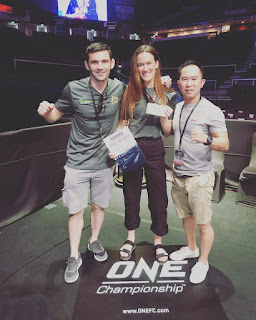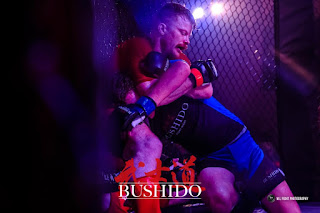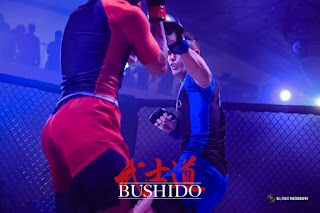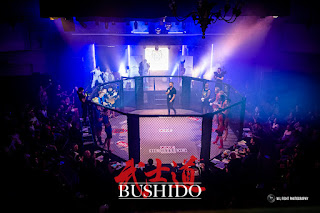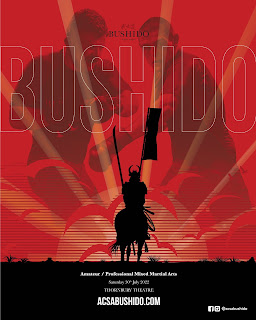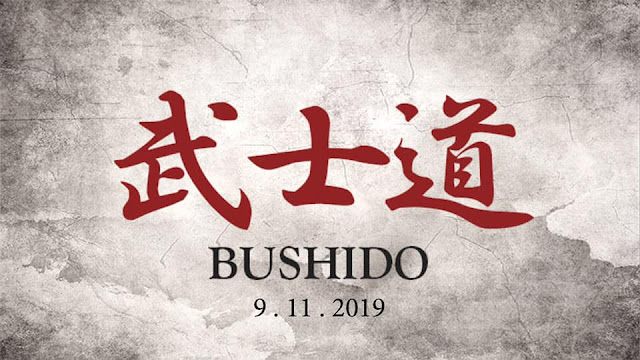Wednesday, 16 February 2022
Why we created Bushido Fight Night : Melbourne MMA
Tuesday, 11 August 2020
MMA Striking Class Video
Tuesday, 23 June 2020
InFocus Video Interview with Will Luu
InFocus Interview
Saturday, 30 November 2019
Annie Thatcher wins Amateur MMA World title in Singapore
This was an especially impressive achievement because Annie had her first MMA bout only 18 months ago. She is now 6 fights for 6 wins in amateur mma and has also had 3 wins in boxing and Muay Thai. Annie has trained almost every day since she first stepped foot in the gym and she has shown tremendous improvement.
Annie is a great example of the kind of work ethic and dedication that we look for in our athletes.
Thursday, 28 November 2019
Advice for MMA Fighters - MMA Melbourne
As a coach, one of the worst things a fighter can do is to train hard in the lead up to a fight and then quit training straight afterwards. This is even worse when the fighters teammates also have upcoming fights to prepare for. It is very unlikely the coach will be prepared to put the same effort into training the fighter in the future if he knows they lack commitment. Another side of this is to not chop and change your training every couple of weeks, stick with what has been getting you results and gradually increase the volume and intensity of your training.
At the elite levels of any sport, every player is playing injured all the time. Get used to it, strap up your injured knee, elbow or foot and keep going. Select different exercises or techniques that won't exacerbate the injury but avoid taking time off at all costs. If training consistently to achieve your goals is important to you you will find a way to make it happen, if it's not important you will find an excuse.
The amount of extra training you'll get done by not working will usually end up not being worth it. Most gyms and martial arts schools do most of their training outside of work hours. Even if you quit your job in order to train full time most of your training partners will be at work.
Focusing on only one area at the expense of other skills will leave holes in your game which will be easily exploited by more experienced future opponents. Competing in other combat sports such as BJJ or amateur Kickboxing is a good safe way to gain valuable experience and develop your skills so that you are more well rounded and more of a threat when you fight in MMA.
Check out our MMA Classes at DKMMA Melbourne
Monday, 14 October 2019
The Importance of Amateur MMA - MMA Melbourne
The Importance of Amateur MMA - MMA Melbourne
One of the biggest problems I see with aspiring fighters is that they are in too much of a rush to fight Pro. If you intend to have a successful long term fight career it is essential to gain as much experience as possible as an amateur. Generally, you will only get one shot at a contract with a major promotion such as the UFC so it's important that you are close to being the finished product when you get there rather than hoping you'll improve once you get there.
Monday, 30 September 2019
Bushido Amateur MMA - MMA Melbourne
We are running our first ever amateur MMA event on Saturday 9th November. There will be no head strikes allowed (standing or on the ground) and will be round-robin format so everyone will get a few matches on the day.
This format will be a good first step for beginners who are looking to eventually compete in MMA but also just for martial artists of various backgrounds to try it out and test their skills under a compromised rule-set.
I believe that no head strikes is the best rule set for beginners to try out MMA. It's a great way for aspiring fighters to gain valuable match experience without the unnecessary risk of injury. I personally competed in many of thees types of matches in the UK in the early 2000s alongside future UFC stars such as Michael Bisping.
Here is the link to register:
https://www.eventbrite.com.au/e/bushido-amateur-mma-competition-tickets-72835722607
Kicks and Knee Strikes to the Legs
Punches to Body and Kicks to Legs are allowed when Opponent is in the downed position.
All throws and Takedowns
All Arm-locks and Shoulder Locks
Chokes and Strangles Excluding Neck Cranks
Leglocks Excluding Heel Hooks
No strikes of any kind permitted to the head.
No Slamming of opponent either as a result of a takedown or to escape a submission.
No Neck Cranks or Heel Hooks.
No Standing Submissions.
A fighter will receive Warning: Two warnings leads to Disqualification
No Grabbing Opponents clothing or Shin-guards, gloves or Knee-pads.
No running out of the competition area.
MMA Shin Guards
MMA Knee Pads
Mouth Guard
MMA or Muay Thai Shorts
One fighter has taken too many unanswered strikes from any position.
One fighter is in a locked-in submission but is refusing to tap and is risking injury.
Submission via Tap Out due to Strikes.
Technical Knockout due to strikes either in Standing or Grounded position.
Referee Stoppage
Judges Decision
Disqualification
Effective Striking - Strikes that have an immediate or cumulative impact with the potential to end the match.
Effective Grappling - Takedowns, submission attempts, reversals and the achievement of advantageous positions that have an immediate or cumulative impact to end the match.
A successful takedown is not just a changing of position, but an attack from the use of the takedown.
Submission attempts taking considerable effort to escape are given greater weight than those that are easily defended and escaped without effort.
Impactful throws and takedowns are weighted more heavily than athletes who are tripped or bundled to the mat.
Monday, 4 February 2019
The Four Stages of Learning Martial Arts
Monday, 21 January 2019
My MMA Journey - Part 3
After my win in Italy at the end of 2003 I was keen to get back in and have another go as soon as possible. Unfortunately, there weren't as many opportunities to fight or MMA events taking place at that stage. I kept myself busy by competing in BJJ, KSBO amatuer MMA events and also some Jiu Jitsu Kumite events which were mixture of semi contact karate and grappling. I was also pretty busy at this time with work and exams, but as soon as my exams were over I made a big push to get matched up for as many MMA matches as I could get.
I had four pro MMA fights in four months from June to September 2004. I won three of those and the fourth was given as a draw however it was one of my most dominant ever fights. I took my opponent down and punched and elbowed him from guard for three straight rounds. In between these fights I also competed in regularly in BJJ and grappling events.
I found all my own matches by contacting promoters and offering to fight anyone they had at a similar weights. Then a group of us would head off on a road trip on Saturday to the other side of the country. Weigh in, have a fight then drive home later that night. Looking back now that probably wasn't the best way to manage a Fight career but I wanted to keep improving and to me that meant testing myself and staying active. I had to fight whoever was offered and keep working to get better between every fight.
Throughout all these fights and during the training camps I was suffering from instability in my knee. I could still and compete but it would pop out every now and again (including during one of my fights) and I needed to keep it heavily taped up when I fought. At the end of 2004 I was booked in to get ACL reconstruction surgery and this put my fight career temporarily on hold.
In Feb 2005 I had a full ACL reconstruction. This can usually take a long time to recover from but I wanted to make sure I was fight ready as soon as possible after the surgery. The first two weeks I was off work stuck at home wearing a huge knee brace and using crutches, as soon as I could walk again I got back to light weight training and also did rehab physio sessions once a week. About a month after the surgery I got back to boxing, however focusing more on punching and not so much footwork. During this time I did most of my boxing training at the Fitzroy Lodge gym in south London.
I also had more exams around May of this year so once my exams were done I wanted to return to full training. Approximately five months after my knee surgery I was ready to get back to grappling training and was able to compete in a grappling tournament again a few weeks later.
Around this time I also got offered a shot to fight on a new MMA promotion which would take place in London in October. I was very keen to get back in and fight to make up for my lost time. In the months leading up to this fight I also went on two training trips, firstly to Amsterdam where I got to train with many legends of Dutch Kickboxing including Ernesto Hoost, and then a few months later I traveled to Brazil where I trained at Brazilian Top Team, which was the leading MMA team in the world at that time.
My first fight back after surgery was against Ciro Gallo in York Hall, Bethnal green. I dropped him with a punch right at the start of the round then got a Judo style Turtle rolling armbar. I was happy with the result of this fight as I had been out of full training and fighting for so long. However as always when I felt a fight was too easy I also had a slight feeling of disappointment that it wasn't enough of a challenge and that I had wasted several months of training and preparation but hadn't really tested myself. However I was never really the type of fighter to pick and choose my opponents or even to bother finding out much about them before i stepped into the ring. I just fought whoever was in front of me. I didn't look as MMA fighting as a career or even a sport. I just looked on it as a realistic way of testing my martial arts skills. If you get attacked on the street you don't get to pick and choose who you get attacked by, you don't ask for someone who is closer to your weight or has a similar record and you certainly don't ask your attacker to come back on another day because you've got a cold or sore elbow.
Tuesday, 11 December 2018
My MMA Journey - Part 2
Sunday, 22 April 2018
CSW Training Trip
Sunday, 1 October 2017
Tough on your Team.
Popularity Versus Performance
One of the great lessons we learned from sports coaching expert Wayne Goldsmith earlier this year was that 'popularity is the enemy of performance'.
Being Honest with your Team-Mates
If you care about your teammate’s progress and success then you need to be honest with them about their training. If your training partner is on a losing streak and you don’t want to see them get knocked out in their next fight you need to be honest with them and tell them that training two hours a week then going for a run on Saturday isn’t going to get the job done.
The Reality
The reality is that your next opponent doesn't care whether you are a nice person and doesn't worry about offending you. He is going to be brutally honest with you over the course of three five-minute rounds and will highlight the areas of your training where you took shortcuts
Tough Coaching
The same is also true when it comes to coaching. Most fighters early in their career are open to advice and constructive criticism. They want to be told where they are going wrong and what they need to improve on. They realise that there will be a huge price to pay if they don't fix up the holes in their game. The job of the coach is to identify these holes and fix them before they can be exploited by a future opponent.
Coaches Versus 'Yes-Men'
If the fighter follows the advice of the coach he will usually experience initial success early on in his career. But this is when something interesting starts to happen. Often the fighters early success will cause him to develop an overblown ego, he decides he no longer needs to be told what he's doing wrong and instead surrounds himself with people who will constantly feed his ego by telling him what he's doing right and how great he is.
“A coach is someone who tells you what you don't want to hear, who has you see what you don't want to see, so you can be who you have always known you could be.”
Thursday, 6 April 2017
Fight Training Mistakes
What is your Goal and What will it take to get there?
What Stage are you at in your Fight Career?
How much Training are you really doing?
Are you doing the Right kind of training or Just doing what you Enjoy?
Are your Training Partners helping you to become a better fighter?
Are you Actually getting any better?
Are you actually sticking with the program or chopping and changing every few weeks?
46 Rounds of Sparring for my 46th Birthday
To celebrate my 46th birthday, I rolled 46 rounds of Brazilian Jiu-Jitsu with my incredible students—all for a good cause! 💪🎉 Each studen...

Popular Posts
-
We have two great seminars coming up soon: On Thursday 7th February we have Alex Volkanovski and Frank Hickman for an MMA Wrestling Semi...
-
Why do some MMA fighters have successful careers while others start off well but then quickly go downhill? I’ve seen fighters have a lo...
-
Over the past two years, I've been working on specific grading criteria for each belt level in my BJJ classes. Previously we had always...







